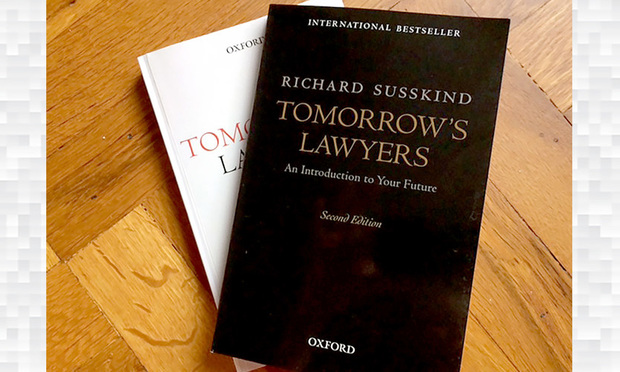 Law firm futurologist Richard Susskind has stirred the legal pot many times with his Book “Tomorrow’s Lawyers” and with lectures and writings about the future law firm.
Law firm futurologist Richard Susskind has stirred the legal pot many times with his Book “Tomorrow’s Lawyers” and with lectures and writings about the future law firm.
The second edition of “Tomorrow’s Lawyers:An Introduction to Your Future” focuses on how law schools are educating students to meet the changes in the profession that have come about largely through technology changes.
Excerpts from the book published by ALM saw both positive and negative reaction from legal leaders, educators, students, analysts and others.
And among the reactions are some negative views on what Susskind thinks those going for a job interview should be asking.
His questions include those relating to not only the firm’s strategy, but whether the firm is comforted by its lack of progress and what would the firm be like if you could design it from scratch.
Not your typical job interview responses, you might think. And some recruiters in the US agree, as per those below –

Rodney Abstone
CEO, ABSTONELALLEY INC.
“A first-year should never expect to be given access to or made aware of any portion of a firm’s strategic plan.“

Karen Sargent
ASSISTANT DEAN AND EXECUTIVE DIRECTOR, OFFICE OF CAREER SERVICES, SOUTHERN METHODIST UNIVERSITY DEDMAN SCHOOL OF LAW
“There is no quicker way to lose a job opportunity than appearing to be an arrogant inquisitor.”

Marcia Shannon
ASSISTANT DEAN OF CAREER STRATEGY AT GEORGETOWN UNIVERSITY LAW CENTER
“While a lawyer with a significant book of business who is seeking a new platform might ask these provocative questions [suggested by Susskind], I believe it is unrealistic for someone with little leverage to ask them, particularly in the interview process.”
Book Excerpt –
If you are a young or aspiring lawyer applying for a new job, I want now to equip you with some questions to pose when, at the end of a gruelling interview, you are faced with the inevitable query: ‘Do you have anything you would like to ask us?’ I also recommend these questions to you if you are a young lawyer wondering whether your current firm is one to which you should commit yourself in the long run. Note that these questions are very similar to those that I ask of law firm leaders when they engage me as an external consultant. Together, they seek to determine the depth of an organization’s insight into the future and its appetite for change.
The questions come with a health warning. There are quite a few of them and, although it is good at a job interview to be engaged, savvy, and interested, I am not suggesting you fire off all of the queries at the one sitting. It is generally counter-productive at interviews to appear excessively objectionable or subversive.
Also, I am conscious that the job market is so intensely competitive that many readers will be glad to secure any position at all, so that these questions might seem of peripheral concern. However, it is good to be armed with some penetrating observations and it should be helpful and relevant for tomorrow’s lawyers to give serious thought to some difficult issues.
Do You Have a Long-Term Strategy?
This simple query can prompt all sorts of physical reactions, from nervous giggles to disparaging grunts. Law firm leaders often respond by claiming that they have not actually written down their strategy in a formal document but that all the partners know what their strategy is. Invariably, this is nonsense.
In such firms, most partners will confess in private to having no clue as to the strategy of their business. The leaders themselves are either dissembling or rationalizing. It is not that a strategy document in and of itself has great value but an absence of such a document usually betrays an absence of strategic thinking.
Beware of law firm leaders who say that in the current economic climate their focus must be on the short term. As stressed in Chapter 6, the best leaders keep one eye on the short term and the other on the long-term strategic health of their organizations. Worry deeply if a senior partner is preoccupied with ‘low-hanging fruit’ or ‘quick wins’. This frequently betrays short-termism which can precede rapid decline.
A quite different response is the production of a fat 300-page report. An external firm of management consultants will often have produced this. This of itself is problematic—the composition of the strategy of a firm, the document which seeks to determine its very future, is too important a task to outsource to another organization. Moreover, it should not take several hundred pages to articulate the strategy for a legal business.
Source: Law.com
